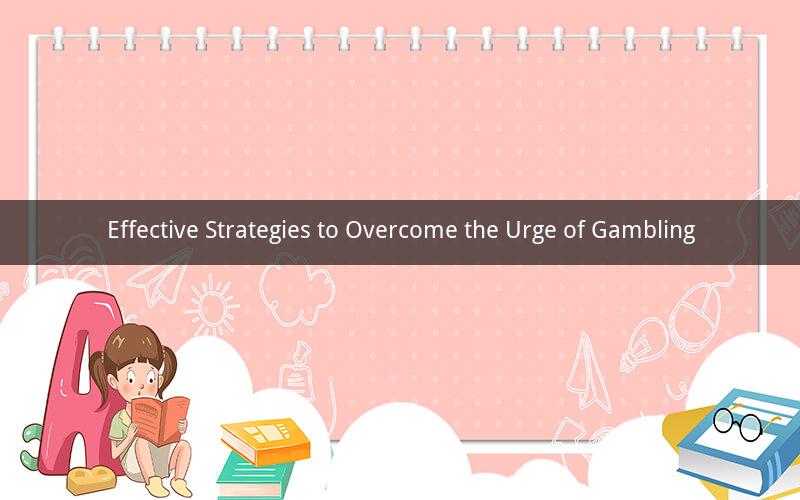
Gambling addiction is a complex issue that affects countless individuals worldwide. It can lead to severe financial, emotional, and social consequences. Stopping the urge to gamble requires a comprehensive approach that addresses both the psychological and environmental factors contributing to the addiction. This article explores various strategies to help you overcome the urge of gambling and regain control of your life.
1. Understand the Underlying Causes
To effectively combat the urge of gambling, it is crucial to understand the underlying causes. These may include:
- Escape from Reality: Many individuals turn to gambling as a way to escape from stress, anxiety, or boredom.
- Social Factors: The allure of social interaction and the thrill of winning can make gambling seem irresistible.
- Psychological Factors: Certain personality traits, such as impulsive behavior and thrill-seeking, may increase the risk of developing a gambling addiction.
2. Seek Professional Help
Professional help can be invaluable in overcoming a gambling addiction. Consider the following options:
- Therapy: Cognitive-behavioral therapy (CBT) and other therapeutic approaches can help you develop healthy coping mechanisms and address the root causes of your addiction.
- Support Groups: Joining a support group, such as Gamblers Anonymous, can provide you with a sense of community and support as you work to overcome your addiction.
- Counseling: A therapist can help you develop a personalized plan to overcome your gambling addiction and provide ongoing support as you progress.
3. Develop a Strong Support Network
A strong support network can make a significant difference in your journey to overcome gambling addiction. Here are some ways to build a supportive community:
- Family and Friends: Communicate with your loved ones about your struggles and ask for their support.
- Support Groups: Joining a support group can provide you with a sense of community and understanding.
- Professional Support: Utilize the resources available through therapists, counselors, and other professionals specializing in gambling addiction.
4. Identify and Avoid Triggers
Identifying and avoiding triggers is essential in overcoming a gambling addiction. Some common triggers include:
- Gambling Venues: Stay away from casinos, racetracks, and other places where gambling is readily available.
- Gambling Websites: Unsubscribe from gambling-related newsletters and delete gambling apps from your phone.
- Social Situations: Be cautious of social situations that may encourage gambling, such as attending parties where gambling is present.
5. Replace Gambling with Healthy Activities
Finding healthy alternatives to gambling can help reduce the urge to gamble. Consider the following activities:
- Physical Exercise: Engaging in regular physical activity can help reduce stress and improve mood.
- Hobbies: Take up a new hobby or revisit an old one to keep your mind occupied and provide a sense of accomplishment.
- Social Activities: Spend time with friends and family who do not engage in gambling.
6. Create a Budget and Stick to It
Creating a budget can help you manage your finances and reduce the temptation to gamble. Here’s how to do it:
- Track Your Spending: Keep a detailed record of your income and expenses.
- Allocate Funds for Entertainment: Set aside a portion of your budget for entertainment, excluding gambling.
- Limit Access to Funds: Keep your gambling money in a separate account that is difficult to access.
7. Set Clear Goals and Monitor Progress
Setting clear goals and monitoring your progress can help you stay motivated and focused on overcoming your gambling addiction. Consider the following steps:
- Set Realistic Goals: Establish short-term and long-term goals that are achievable and measurable.
- Track Your Progress: Keep a journal or use a tracking app to monitor your progress.
- Celebrate Achievements: Acknowledge and celebrate your successes along the way.
8. Practice Self-Care
Taking care of your physical, emotional, and mental well-being is crucial in overcoming a gambling addiction. Here are some self-care tips:
- Eat a Balanced Diet: Maintain a healthy diet that includes plenty of fruits, vegetables, and whole grains.
- Get Adequate Sleep: Aim for 7-9 hours of sleep per night to help improve mood and reduce stress.
- Engage in Relaxation Techniques: Practice relaxation techniques such as meditation, deep breathing, and yoga to help manage stress and anxiety.
9. Stay Committed and Persistent
Overcoming a gambling addiction is a challenging process that requires dedication and persistence. Stay committed to your journey and be patient with yourself as you progress.
10. Consider Medication
In some cases, medication may be necessary to manage the symptoms of gambling addiction. Consult with a healthcare professional to determine if medication is appropriate for you.
Questions and Answers:
Q1: What are some common signs of a gambling addiction?
A1: Common signs of a gambling addiction include hiding gambling activities, feeling remorse after gambling, spending more time and money on gambling, and neglecting other responsibilities.
Q2: Can a gambling addiction be treated?
A2: Yes, a gambling addiction can be treated effectively through a combination of therapy, support groups, and lifestyle changes.
Q3: How can I tell if I need professional help for my gambling addiction?
A3: If you are struggling to control your gambling, experiencing financial, emotional, or social consequences, or if you have tried to stop gambling on your own but have been unsuccessful, it may be time to seek professional help.
Q4: Are there any natural remedies to help with gambling addiction?
A4: While there are no natural remedies that can cure a gambling addiction, certain lifestyle changes, such as engaging in regular physical activity and practicing relaxation techniques, can help manage symptoms and reduce the urge to gamble.
Q5: How long does it take to overcome a gambling addiction?
A5: The length of time it takes to overcome a gambling addiction varies from person to person. Some individuals may experience significant improvement within a few months, while others may require ongoing support and therapy for several years.